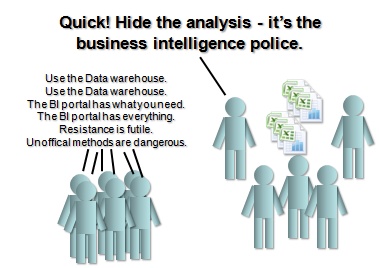« The Microsoft Version Skip- XP Mode | Business Intelligence adoption low and falling »
Pragmatic Business Intelligence
I’m a regular reader of datadoodle, and there have been a couple of great posts recently talking about what I think of as “Pragmatic BI”.
The first one talks to the question of what the perfect BI tool is– answer? One that people actually use. The second uses a story to illustrate that many uses of information to make better decisions are business intelligence– even if one of the Mega tool suites isn’t used, and there is no massive data warehouse in sight.
 Both of these blog posts remind me of my days in the business intelligence supply side of a large organization, where I was tasked with creating, maintaining and evolving the “official” business intelligence systems. Anytime I gave a presentation to end users (often a demonstration of a new tools capabilities and power) the same question would always come up- Can we export data into our spreadsheets?
Both of these blog posts remind me of my days in the business intelligence supply side of a large organization, where I was tasked with creating, maintaining and evolving the “official” business intelligence systems. Anytime I gave a presentation to end users (often a demonstration of a new tools capabilities and power) the same question would always come up- Can we export data into our spreadsheets?
Everytime I showed an export to Excel functionality, the release of tension in the room was noticable. Everyone relaxed. They could get their numbers out, they could take charge themselves, and could get the information they needed. We worked hard to try to provide the functionality in the core systems, but the reality is that the needs of the users changed, often more quickly than we could make our massive databases, ETLs and SQL structures evolve. We were beholden to our change management procedures, we had to analyze the impact of changes on the whole.
At times, it was suggested that we “crack down” on the proliferation of spreadsheets and home made MS Access databases that sprouted when a need couldn’t be met by the main system. But the reality is, the best solution is to work with the analysts- provide them new tools, understand their needs and don’t rule out solutions just because they do not follow the “standard” business intelligence methodology of servers, big integrated suites of tools and rigid IT department involvement.
As with all things in life, balance between the “proper” way to do things, and a pragmatic approach that values individual initiative and results is important. After all, it’s the only way what is “proper” can ever evolve and improve.
« The Microsoft Version Skip- XP Mode | Business Intelligence adoption low and falling »


On the flip side – it’s funny how these “side systems” have come to be so acceptable for BI, but not for other systems. For example, it would be ludicrous to imagine someone in corporate finance creating his or her own Access- or Excel-based General Ledger system because they found the corporate standard one too confusing, or too slow or (even better) didn’t like the numbers.
And yet it’s quite common to find desktop solutions that are developed by one user in isolation, in order to “report” the numbers from the very same GL system!
It’s a bit of a double-standard that paints BI in a “not quite as rigorous” or “not quite as important” light. Good management support would go a long way towards fixing this.